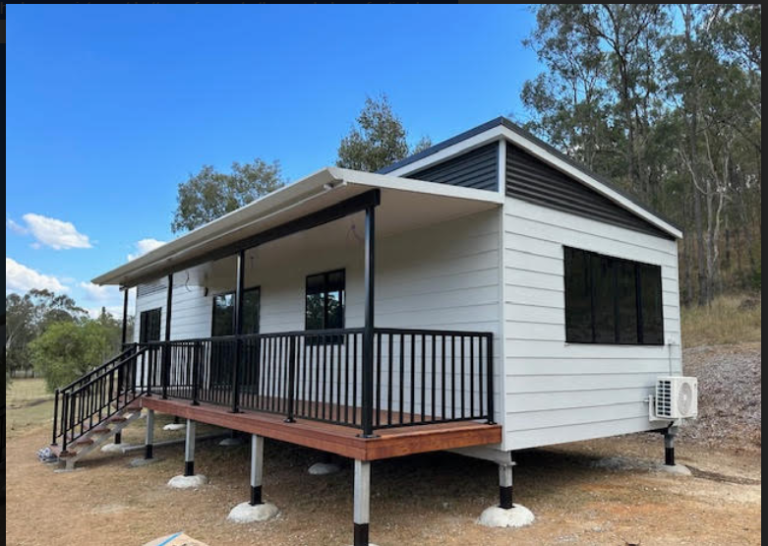With the appeal of minimalist living, affordable housing, and the desire for freedom, many are exploring the option of building or buying tiny homes. A crucial question arises: Do you need council approval for a tiny home in Queensland? Several factors come into play, including the type of tiny home, location, and intended use. In this post, you will learn the essential details about tiny house regulations in Queensland, what you need to know about tiny homes, and how to ensure you comply with local laws.
What Are Tiny Homes?
Tiny homes in Queensland refer to small, portable, or permanent homes that range from 10 to 50 square metres in size. These homes are designed to be compact, efficient, and eco-friendly, with the idea of minimising living space while maximising functionality. Tiny homes come in various forms, but the two most common types are tiny houses on wheels and stationary tiny homes built on foundations.
A tiny house on wheels (THOW) is a mobile structure, similar to a caravan, designed to be moved from one place to another. A permanent tiny home on a foundation is treated like a regular house and must meet local building codes and zoning laws.
Tiny House Regulations in Queensland
Understanding tiny house regulations in Queensland determines whether or not you need council approval for your tiny home. These regulations are governed by local councils, responsible for planning, zoning, and building approvals. The rules and guidelines can vary across the state, so it’s important to consult your local council before proceeding with any plans.
Tiny Homes on Wheels: The Grey Area
The main aspect of confusion is whether or not you need approval for tiny houses on wheels. These mobile homes, if used as temporary residences, are considered caravans under Australian law. As a result, they might not require the same level of approval as a fixed, permanent dwelling.
In Queensland, if you plan to place your tiny house on wheels within a caravan park or on land zoned for caravans, you may not need council approval. If you intend to live in your tiny house on wheels outside of a designated caravan park or campgrounds, local councils may require approval under the Planning Act 2016. This is because the land is being used for residential purposes, which could be outside of zoning laws intended for mobile homes or recreational vehicles.
Permanent Tiny Homes: Building Approval Required
If you are planning to build a tiny home on a fixed foundation, you will certainly need to apply for council approval. Permanent tiny homes are subject to the same building codes and planning regulations as traditional houses. This includes complying with structural requirements, safety standards, and zoning laws.
The approval process for a permanent tiny home involves submitting a development application to your local council. This application will be assessed based on various criteria, including the home’s design, its impact on the environment, and its compatibility with the surrounding area.
The approval process for a permanent tiny home can be more time-consuming and complex than for a tiny house on wheels. It’s essential to work closely with architects and builders familiar with tiny house design and the applicable regulations in your area.
Key Considerations When Seeking Approval for Tiny Homes
While tiny homes offer a unique and sustainable housing option, navigating council approvals in Queensland can be tricky. Here are some key factors to consider:
Zoning Laws
Zoning laws dictate how land can be used and what type of buildings can be constructed. For example, some areas are designated as residential zones, while others may be intended for agricultural or commercial use. Before applying for council approval, determine whether the land you intend to build is zoned for residential use and whether a tiny home is permissible in that zone.
Building Code Compliance
All buildings in Queensland must comply with the Queensland Development Code (QDC), which outlines standards for construction. These include provisions for structural integrity, fire safety, energy efficiency, and plumbing. A tiny home built on a permanent foundation must meet these standards, which may include specific requirements regarding insulation, ventilation, and wastewater management.
Tiny House Design
The size, layout, and materials used in the construction must comply with council guidelines. Many councils also have aesthetic requirements, in residential or culturally significant areas. Ensure that your tiny house design is in line with the local aesthetic and construction standards to avoid delays in approval.
Conclusion
Whether or not you need council approval for a tiny home in Queensland depends on the type of tiny home you are planning to build or buy, its intended use and location. Tiny houses on wheels may not always require council approval if used as temporary residence in designated areas. Permanent tiny homes and those intended as full-time residences require council approval and must comply with local zoning laws, building codes, and other regulations.
For those interested in tiny houses for sale, ensure that the tiny home meets all local regulations before purchasing. Consulting your local council and professionals familiar with tiny house design and regulations will guide you through the approval process and ensure your tiny home journey is as smooth as possible.


 :
: